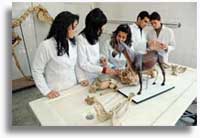VETERINARY SCIENCE
Introduction
Veterinary Science is the science of diagnosing, treating and curing the diverse types of diseases in birds and animals. The subject broadly covers the study of animal physiology, treatment and prevention of diseases among animals. The basic principles of this specialized branch of study are quite similar to that of human medical sciences. But the job profile of a veterinary doctor or a vet is much more than that of a general physician or a surgeon. It involves not only taking care of animal health but also includes scientific breeding and handling of livestock. Besides giving treatment, Vets perform surgery, prevent spreading of diseases in animals by administering timely vaccination and medicines and give advice on care of pets and farm animals.

Their activities may also include Animal husbandry- animal breed improvement by 'selection breeding' and artificial insemination, animal research in order to control spread of diseases transmitted through animals; thus protecting the public from exposure to diseases carried by animals, wildlife conservation, poultry management and health care, livestock insurance and rural development. Broadly a veterinary doctor has a major role in the conservation of livestock and domestic animal wealth.Veterinary doctors deal with the treatment, care and handling of domestic pets, livestock, animals in the zoo, laboratory, sporting animals or animals with the government's animal husbandry departments.
They take up practice exclusively of either large animals such as cattle including horses, pigs, sheep; poultry, etc or small animals mainly household pets including dogs, cats, birds, etc. or both. The approach in treatment vary according to different animals. The vets must be familiar with the many breeds of pets or livestock and the characteristics of each so that they can recommend diets, exercise regiments and treatment, specific to the breed. The scope for veterinarians in the future is bright. As keeping pets is becoming a fad now with the Indians, the demand for private veterinary clinics is on the rise in metropolitan cities and smaller towns. And similarly, there has been an unprecedented growth in the poultry sector and animal products' technology sector, resulting in an increased demand for veterinarians in different sectors of livestock and poultry.
Veterinary Science deals with the study of animal health care, breeding, feeding and management practices. The job of a veterinarian is challenging keeping in view the wide range of animals. Contrary to earlier belief, veterinary profession is no longer the male bastion.
Eligibility
For taking admission in the B.V.Sc & A.H (Bachelor of Veterinary and Animal Husbandry) course, the minimum requisite qualification is 10+2 with Physics, Chemistry and Biology (PCB). For national level test minimum percentage required is 50% for general category and 40% for SC/ST. The minimum age required is 17 years. Candidates are selected for this five years B.V.Sc. & A.H course on the basis of entrance test held by State Agriculture University at State level and by VCI (Veterinary Council of India) at National level. 15% seats in every college are filled through national level test and rest by the State level test.
Future of Veterinary Profession:
Veterinary Science
|
India has the largest livestock population of more than
500 million heads, which contribute 15% of the world's
population. The demand of Veterinarians to take care
of this huge livestock is on the rise.
|
|
Due to commercialization of veterinary industry and the
policies more and more international industries of food
manufacturing, pharmaceutical, diagnostic and vaccine
production etc. have opened up demand for
veterinary professionals.
|
|
Increasing awareness about veterinary education is done by
introducing various schemes viz. National talent
scholarship, junior and senior ICAR fellowships,
internship allowance at higher rate and pay package
to veterinary professionals equivalent to
professional of other field.
|
|
Job prospects in comparison to other professional and
technical degree programmes are better for
veterinary graduates.
|
|
Scope for entrepreneur development in diversified areas
is on the rise. Canine and feline practice in cosmopolitan
cities, establishment of diary and poultry industries,
milk and meat processing venture, establishment
of livestock business and marketing etc. are
gaining momentum.
|
|
Opportunities for higher education in foreign countries
and demand for qualified professionals in developed
country is attracting Indian veterinarians.
|
|
Liberalization of loans through agencies like the NABARD,
Rural Cooperative Banks and Nationalized Banks under
the rural development programmes, establishment of
policlinics and livestock sector for operationalization
and monitoring of the above scheme are boosting
the demand for veterinarians.
|
|
Remuneration
The amount of remuneration of a veterinarian depends upon the kind of practice and the animals that are treated. An average vet can earn between Rs.10, 000 to Rs.50, 000 per month. A private practitioner may easily get lucrative monetary returns depending on his popularity and the number of years of experience. He may be able to earn Rs. 500 - Rs. 2000 per patient, depending on the type of medical treatment the animal needs. As an Assistant Professor, a vet can earn a salary over Rs 10,000. The government also has job openings in this field, as livestock development officers, and the pay is Rs. 12,000 depending on position and experience.


